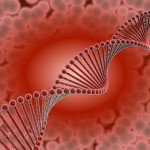CVS or chorionic villus sampling is a diagnostic, prenatal test used to test for chromosomal abnormalities in a fetus between week 10 and week 14 of pregnancy. It is preferred to amniocentesis if you are less than 15 weeks pregnant, but need to check for abnormalities. In CVS, samples of the chorionic villi (the extensions […]
zygote

Meiosis
Meiosis is a type of cellular division in which one cell with 46 chromosomes splits into two cells, each with 23 chromosomes. It is through this process that the male sperm and female ovum (egg) are formed. Meiosis allows the sperm and egg to contribute half of your baby’s genetic information to the 46 chromosome […]

Mitosis
Mitosis is a type of cellular division which not only takes place during pregnancy, but also throughout our lives. In mitosis the DNA of each cell (which is normally made up of 46 chromosomes in a human) replicates so that there are 92 chromosomes. Once the DNA has replicated the cell splits into two diploid […]
Placenta
The placenta is a fetomaternal organ that is formed after fertilisation when the zygote implants into the mother’s uterine lining. It has 2 main components: the fetal placenta, which develops from the zygote, and the maternal placenta, which grows from the mother’s uterine tissue. The placenta grows throughout your pregnancy and at 40 weeks will […]
Fetus
A fetus is the scientific term for your baby after he has completed the embryonic stage and before he is born. In other words your baby is considered a fetus between week 10 and week 40. Unlike the zygotic and embryonic stages of your baby’s development, your fetus actually looks human. Congrats mum and dad […]
Zygote
Your baby is scientifically known as a zygote for about 5-7 days after fertilisation. A zygote is best explained as the cell that results from the fusion of two gametes. In the case of your baby, the gametes are your partner’s sperm and your egg. Zygotes carry the genetic information which will determine what your […]
Embryo
Between week 3 and week 10 your baby is in the embryonic stage of his development, which means the scientific term for your baby at this time is an embryo. The development of the embryo is known as embryogenesis. The zygote which forms after fertilisation undergoes mitosis for about 5 to 7 days until it […]
Conception
Conception is the more colloquial term for fertilisation, a 3 step process, which occurs during the first two weeks of pregnancy and ends with the fusion of the father’s sperm and the mother’s egg or ovum. Step 1 involves the production of gametes, the cells which carry all of the genetic information necessary for reproduction. […]
Fertilisation
Fertilisation is the more scientific term for conception, a 3 step process, which occurs during the first two weeks of pregnancy and ends with the fusion of the father’s sperm and the mother’s egg or ovum. Step 1 involves the production of gametes, the cells which carry all of the genetic information necessary for reproduction. […]